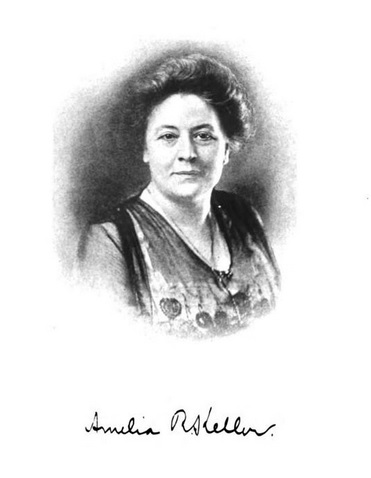| This article contains close paraphrasing of a non-free copyrighted source, https://documents.alexanderstreet.com/d/1010111676 (Copyvios report). Relevant discussion may be found on the talk page. Please help Misplaced Pages by rewriting this article with your own words. (January 2024) (Learn how and when to remove this message) |
| Amelia R. Keller | |
|---|---|
 | |
| Born | January 12, 1871 Cleveland, Ohio |
| Died | January 28, 1943 Indianapolis, Indiana |
| Education | Central College of Physicians and Surgeons (MD) |
| Occupation | Physician |
Amelia R. Keller (1871–1943) was an American early activist in the women's suffrage movement and was among the first woman physicians practicing in Indianapolis, Indiana. She was also one of the first women to teach at the Indiana University School of Medicine in 1908, and co-founded the Women's Franchise League of Indiana in 1911.
Early life and education
Amelia R. Keller was born in Cleveland, Ohio, on January 12, 1871, to parents Frederick Carl Keller and Elizabeth Ruemmele, both of whom were German immigrants. The family came to Indianapolis when Keller was a young girl; she remained there for the rest of her life. She graduated from Indianapolis High School (later Shortridge High School). Before attending Chicago's Women's Medical College, Keller studied under Indianapolis physicians Dr. W. B. Fletcher and Dr. Mary Spink. Keller would then go on to earn her medical degree in 1893 from the Central College of Physicians and Surgeons in Indianapolis, becoming one of the first woman physicians to practice in Indianapolis.
Career
Physician and teacher
In addition to a busy general practice specializing in pediatrics, Dr. Keller also lectured on social hygiene and child welfare. She joined the faculty of the Central College of Physicians and Surgeons in 1906, then apart of the School of Medicine of Purdue University. When the school was absorbed by the Indiana University School of Medicine in 1908, she became one of the first women to teach there and continued to serve as an associate professor of Pediatrics and diseases of children. She taught at the school from 1908 to 1919 and spoke often on public health matters. She also served as family physician to Indiana Governor James P. Goodrich.
Activism
Keller is well known for her prominent leadership for women's rights and suffrage. She championed equal pay for women and their entrance into public sectors such as business and law enforcement. In 1903, Dr. Keller was a candidate for the Indianapolis school board while serving as President of the Political Equality Society. In 1906, she helped to elect the first female member of the Indianapolis school board: Mary E. Nicholson. Dr. Keller founded the Woman's School League, which would later become the Women's Franchise League of Indiana; she would serve as its president from 1910–1917. Under her guidance, the League flourished and quickly became a statewide network of suffragists numbering in the thousands. It was an effective organization consisting of a hundred branches under district and county chairmanships and earned recognition with the National Woman's Equal Suffrage Association. The efforts of the Women's Franchise League of Indiana, who appealed to lawmakers and spoke at street meetings, helped secure Indiana's 1920 ratification of the Nineteenth Amendment to the United States Constitution. Dr. Keller was also an editor of the Citizens League of Indiana's monthly magazine, The Citizen, in the suffrage department. She also served in a nonpolitical organization as the first president of the Woman's Rotary Club of Indianapolis, organized on April 28, 1919, where she led the group's effort to promote the business interest of all its members and provide financial assistance to women of non-traditional age seeking undergraduate or graduate degrees. After the 19th Amendment passed and women gained the right to vote, Dr. Keller became active in the Republican Party and worked with many women's organizations within the party and made speeches for party candidates. She also continued her club work, serving as first Vice President of the Indiana Federation of Clubs and President of the Indianapolis Council of Women. She was active in Indiana politics until her death in 1943 and was buried in Crown Hill Cemetery in Indianapolis.
References
- ^ "Biographical Sketch of Amelia R. Keller | Alexander Street Documents". documents.alexanderstreet.com. Retrieved 2024-01-23.
- ^ IHB (2022-06-28). "Dr. Amelia Keller, 1871-1943". IHB. Retrieved 2024-01-23.
- ^ "Amelia R. Keller". indyencyclopedia.org. 2021-02-05. Retrieved 2024-01-23.
- ^ "Amelia R. Keller, MD: First woman faculty member of IU School of Medicine, Advocate, and Civic Leader". blogs. 2019-03-06. Retrieved 2024-01-23.
- ^ Pieczko, Brandon T. (2022-04-19). "Celebrating Dr. Amelia R. Keller: Pioneering Physician, Educator, Suffragist, and Public Health Advocate". IUPUI ScholarWorks.
- "Online Archive Women Creating Excellence at IUPUI: Amelia Keller , M.D." IUPUI Office for Women.
- "Historical marker at IUPUI honors IU School of Medicine's first female faculty member". blogs. 2022-03-28. Retrieved 2024-02-06.
- Simins, Jill Weiss (2020-06-17). "A Silent Roar: Indiana Suffragists' 1913 March to the Statehouse". The Indiana History Blog: Indiana Historical Bureau of the Indiana State Library. Retrieved 2024-01-23.